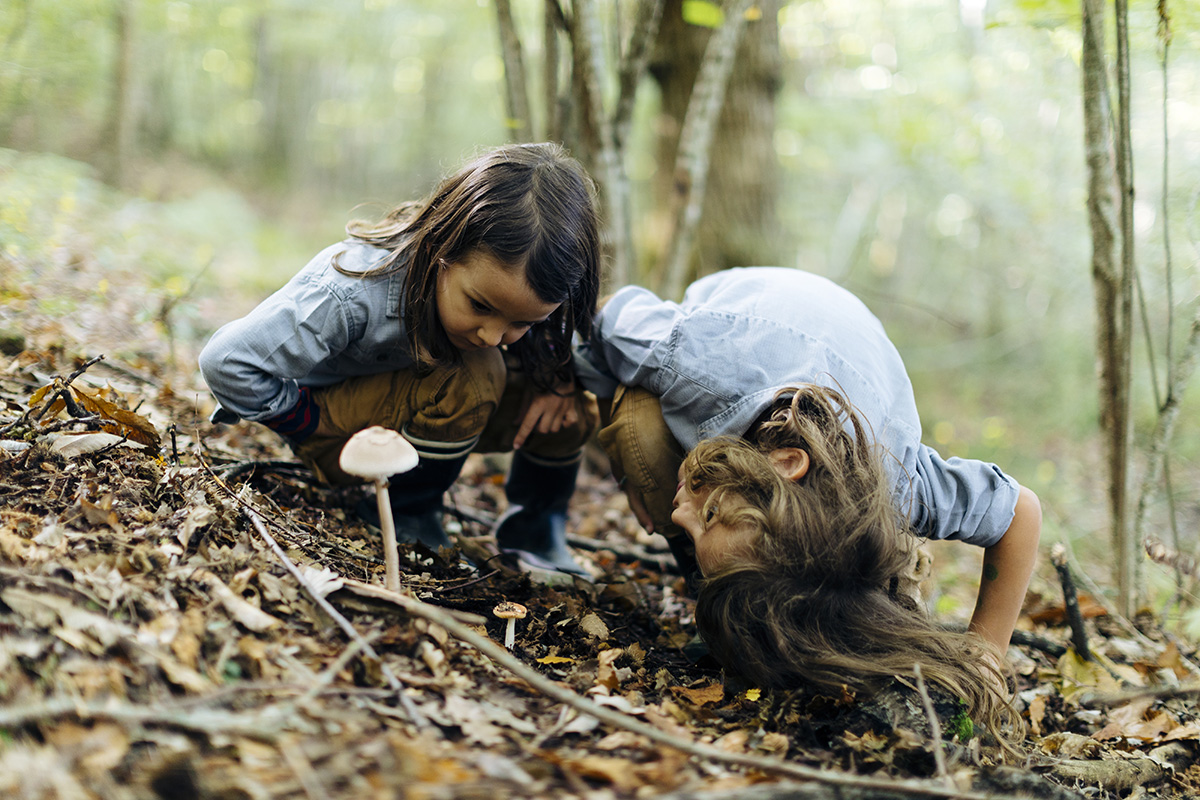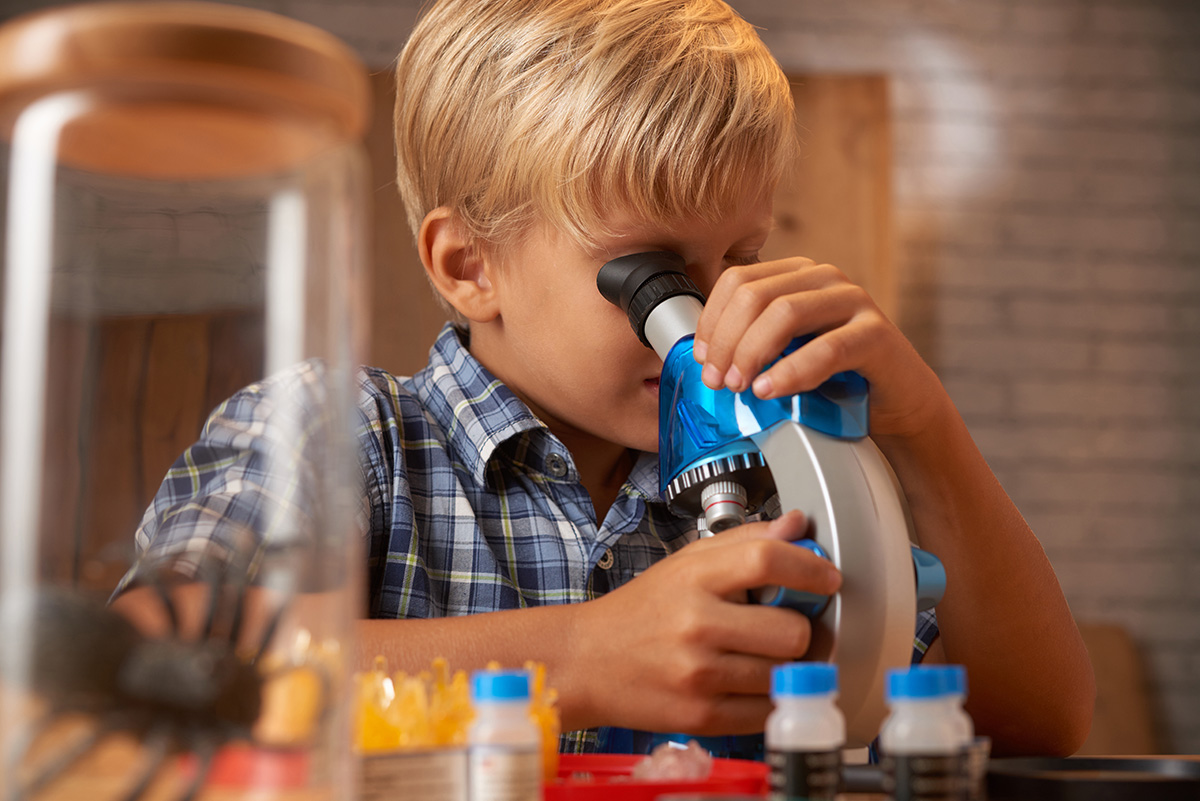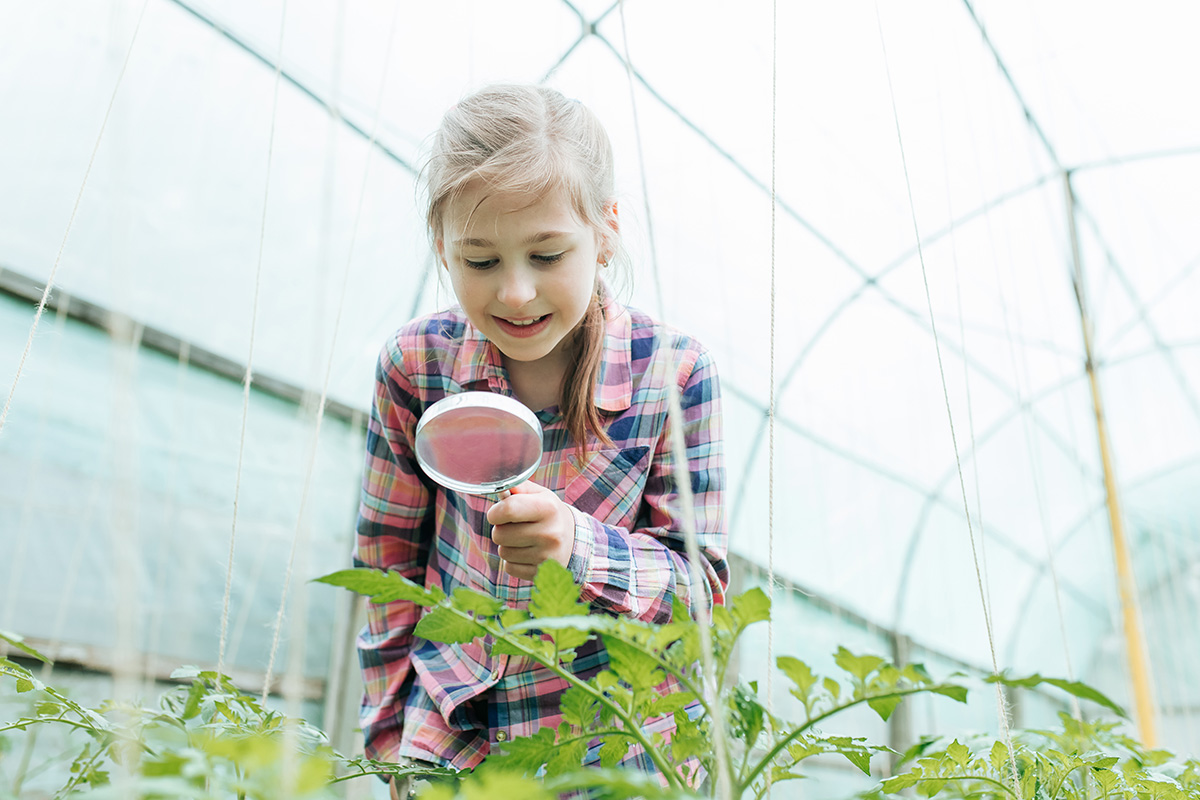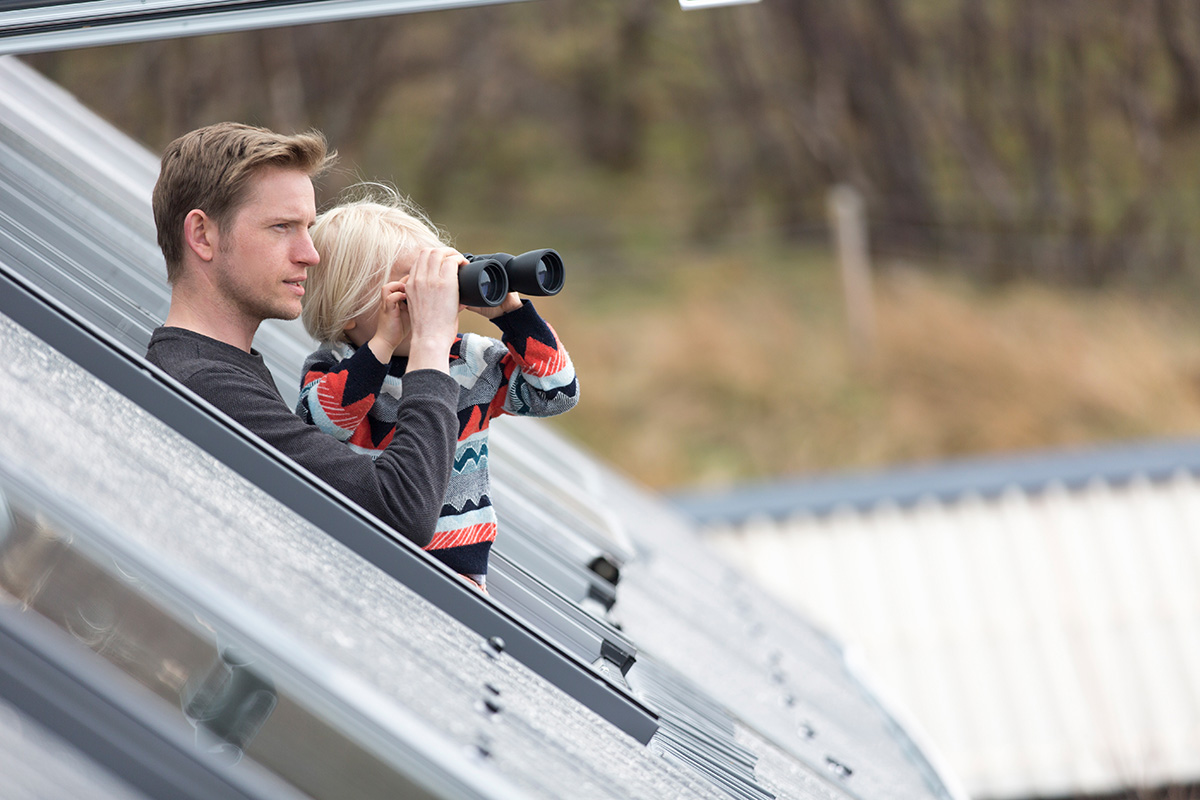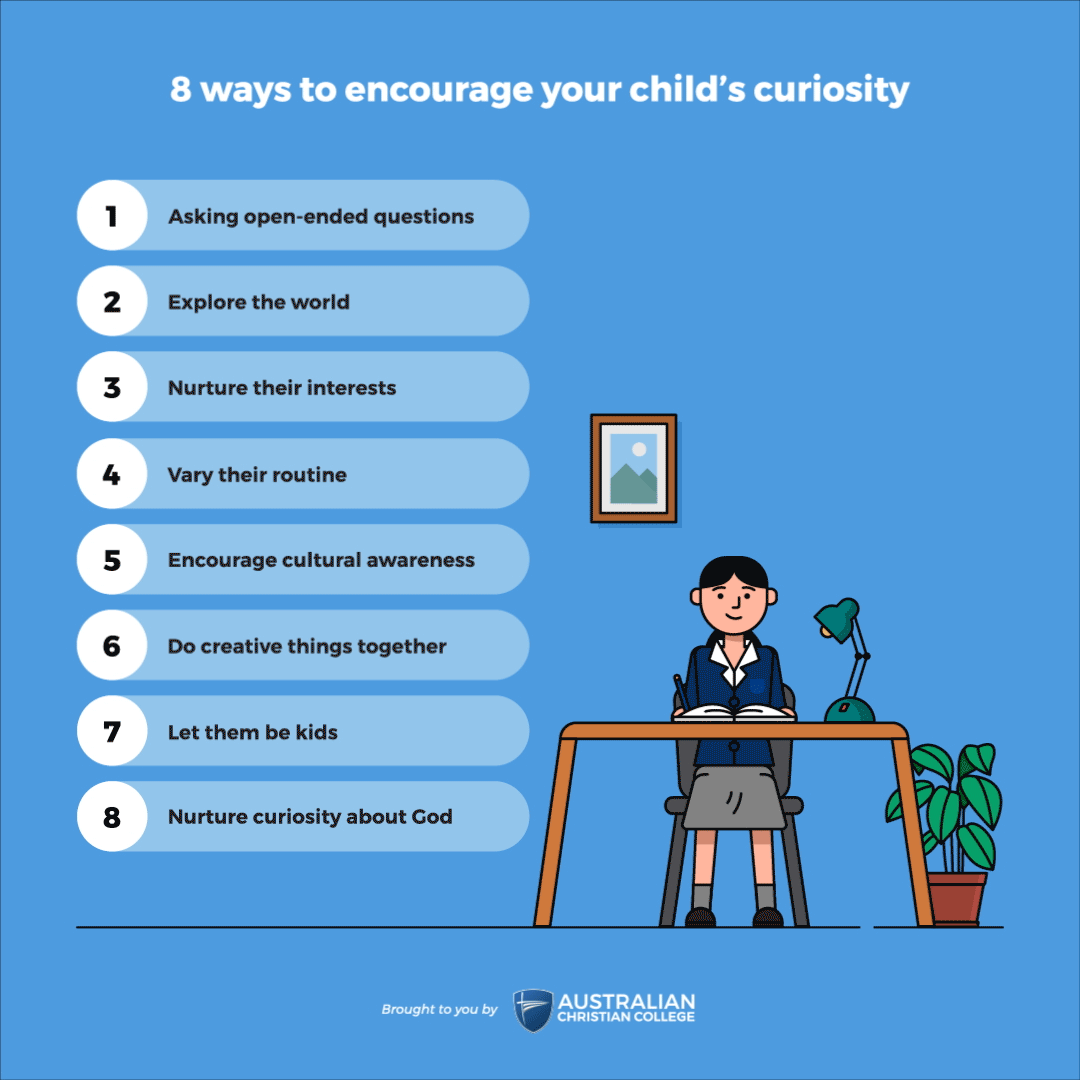Helping Your Child Develop a More Curious Mind

Table of Contents
- Why Curiosity Matters – What it is and isn’t
- Curiosity, wisdom and sin
- Why We Need More Curious Children
- The benefits of curiosity
- Let Your Child’s Mind Wander
- Freedom fosters curiosity
- Inspire Your Child to Ask, Ask, Ask
- 8 ways to encourage your child’s curiosity
- Setting Your Child Up for Long-Term Success
Curiosity sometimes gets a bad rap (like blame for killing the cat), but our world would look very different without the curious people who have shaped the way we live. We wouldn’t have electricity or cars, let alone contemporary technologies like the internet, computers and robotics.
And innovative ideas don’t only come from curious adult minds.
Children have been responsible for numerous inventions we now take for granted. In 1717, Benjamin Franklin fashioned the world’s first swim fins at age 11. In 1824, 15-year-old Louis Braille – who was rendered blind by an eye injury at age three – invented the system that allows people who are blind to read using a series of raised dots. Children also invented the trampoline, snowmobile, water skis, and popsicles. Clearly, curiosity in children is a gift.
Kids love exploration and discovery. As a parent, you can encourage them to develop their innate sense of curiosity. As a Christian parent, you can frame this around a wonder for God’s creation, people, and his marvellous plan for our lives.
Why Curiosity Matters – What it is and isn’t
Curiosity in children matters because it drives us to understand more about our world. It has led to life-changing discoveries in the fields of medicine, mathematics, archaeology, linguistics, engineering and more. Curiosity also encourages us to ask questions like “Why am I here?”, “What is the meaning and purpose of life?” and “Is there a God? If so, what does that mean for me?”
The Merriam-Webster dictionary defines curiosity as a “desire to know”, including an “inquisitive interest in others' concerns” or an “interest leading to inquiry”. But what does God have to say about it?
While the Bible doesn’t offer us a simple definition of curiosity, it has a lot to say about it. Numerous verses encourage God’s people to be curious, and in particular to seek His ways for using this trait. Proverbs 4:5-9 entreats us to “Get wisdom; get insight: do not forget, nor turn away from the words of my mouth. … Prize [wisdom] highly, and she will exalt you. … She will bestow on you a beautiful crown.” Proverbs 25:2 tells us “It is the glory of God to conceal a matter; to search out a matter is the glory of kings.”
Curiosity, wisdom and sin
Importantly, however, it tempers advice like this with a warning: when not submitted to God’s purposes, our natural curiosity can lead us into sin. For example, it could turn us into busybodies who meddle in other people’s affairs (1 Timothy 5:13) or fill us with pride over our knowledge (1 Corinthians 8:1). Develop children's curiosity will care.
“The Bible was written not to satisfy your curiosity but to help you conform to Christ’s image. Not to make you a smarter sinner but to make you like the Savior. Not to fill your head with a collection of biblical facts but to transform your life.” – Howard G. Hendricks
The book of Ecclesiastes offers a profound insight into how curiosity controlled “Under the sun”, rather than submitted to the Son, can end up: “All things are wearisome, more than one can say. The eye never has enough of seeing, nor the ear its fill of hearing.” (1:8)
What does this mean for Christian parents and caregivers? It’s great to encourage a curious child, but be mindful of doing it in a way that draws attention to Jesus – the creator, sustainer and Saviour of our world.
Why We Need More Curious Children
While our world remains under God’s sovereign control, sin and the curse have had devastating consequences for the planet and people. Curious children are the change-makers and problem-solvers of tomorrow. Developing curiosity wisely is a good thing.
And some curious kids are already making a difference. Take Swedish environmental activist Greta Thunberg, who is renowned for challenging world leaders to act on climate change. Now 19, her activism career began with spending Fridays holding a placard outside Swedish parliament at age 15. Whatever you think of her policies and methods, there’s no doubt she’s having an impact.
In addition to environmental issues, we need curious children to think through and discover solutions to worldwide problems such as:
- Infectious disease outbreaks
- Injustice and inequality
- Conflict and war
- The refugee crisis
- Food insecurity
- Poverty.
A child's age shouldn't act as a deterrent to develop curiosity
“It's through curiosity and looking at opportunities in new ways that we've always mapped our path at Dell. There's always an opportunity to make a difference.” – Michael Dell
Importantly, we also need children who are curious about God and people to show His love to the world. By pondering the deep questions of life and embracing the Christian faith, these children can have an impact on their family and friends. They can also grow to become the pastors, theologians, apologists and missionaries of the future. A child's development can be enhanced by intentionally fostering curiosity.
Children raised with love and encouraged to pursue their interests can make a difference not only in this world, but for eternity.
The benefits of curiosity
It’s clear as a God-given trait, it’s important to nurture and encourage curiosity in our children. Being curious has several important benefits.
Curiosity supports academic achievement
Curiosity drives exploration, learning and discovery, so it stands to reason that it’s linked with academic performance. This link has been proven through research and shown to start in the early school years. A 2018 study found that greater curiosity was associated with higher achievement in reading and math in Kindergarten students. The researchers concluded that curiosity may be an important under-recognised contributor to academic achievement and therefore worth fostering to optimise academic performance in young children.
Other researchers have called curiosity the “third pillar of academic performance” (along with intelligence and effort), with results of their 2011 study highlighting that a "hungry mind" is a “core determinant of individual differences in academic achievement”.
“Curiosity is one of the most permanent and certain characteristics of a vigorous intellect.” – Samuel Johnson
Curiosity helps us be more empathetic
Being curious and willing to learn about people outside of our usual sphere helps us better understand those whose life experiences and worldviews differ to our own. Getting a fuller picture of someone’s background, upbringing and ideas helps to build empathy. This is especially important when we meet people who we seem to have little in common with, such as those from other faiths or cultural backgrounds.
Curiosity helps us to build relationships
With its empathy-building power, curiosity also fosters the development and strengthening of relationships. In one study, strangers were asked to pose and answer increasingly deep personal questions to mimic the natural development of interpersonal relationships. The researchers found that people who showed genuine curiosity were rated as being warmer and easier to build closeness with. As you can see, fostering curiosity is more than merely child's play - it has long lasting benefits.
Curiosity boosts wellbeing
Research indicates that more consistent curiosity is linked with greater life satisfaction and wellbeing, along with lower levels of depressed mood.
A study published this year found that people who described themselves as being curious, and those with a strong desire to seek out information, were more likely to report higher levels of wellbeing during the pandemic.
_“Satisfaction of one's curiosity is one of the greatest sources of happiness in life.” – Linus Pauling
Curiosity also helps us to:
- Be better problem solvers – curiosity leads us to ask more questions, think critically, and seek different ways of solving problems.
- Grow in knowledge – as we explore and find answers to our questions.
- Overcome our fears – being curious helps us face our fear of the unknown and step outside our comfort zones in pursuit of knowledge.
- Become more humble – the more we learn, the more we discover we don’t know. This increases our appreciation of God’s infinite wisdom and the extent to which his knowledge outstrips ours (Isaiah 55:8-9).
Remember, you’re not encouraging your child’s curiosity for its own sake, but to support the development of wisdom and godly character. So allow them to wonder aloud, make their own choices (sometimes), and they're more likely to feel confident in their relationship with God.
As Augustine wrote:
“Free curiosity has greater power to stimulate learning than rigorous coercion. Nevertheless, the free ranging flux of curiosity is channeled by discipline under Your Law.”
God’s word tells us that the fear of the Lord is the beginning of wisdom (Proverbs 9:10). Framing curiosity around God’s purposes for their lives can start your kids on a wonderful road of discovery that will see them using their gifts and interests for his good pleasure.
Most importantly, curiosity can drive their desire to know God and become more like Christ – God’s ultimate goal for their lives.
Let Your Child’s Mind Wander
Have you ever spent time rigorously searching for a solution to a pressing problem or wracking your brain to remember a specific word – only to have the answer pop into mind while you’re driving home, in the shower, or walking the dog? Sometimes, these answers even wake us up in the middle of the night. There’s a reason this happens. Our minds need room to process and connect information.
Similarly, curiosity needs mental space to grow and flourish. However, many children in contemporary western society lead highly scheduled lives. A rigid routine of homework, sport, music lessons and more leaves little space for your child’s mind to ponder their interests – or even know what they are.
Furthermore, every spare minute is frequently filled with device time, with kids scrolling through social media and playing online games to combat boredom.
However, it turns out that boredom is actually good for kids. According to an article by the Child Mind Institute, boredom helps children develop important skills like tolerance, flexibility, problem-solving and organisation. It also fosters creativity by making room for curiosity and original thinking.
Freedom fosters curiosity
There’s nothing wrong with devices and activities. Just remember to factor some time for letting their mind wander into your child’s schedule. And don’t let them fill every unscheduled moment with devices. You might be surprised what they come up with. One summer holiday, my daughters begged me to let them watch TV. I refused. They ended up inventing an elaborate game with their toy horses. Not only did this keep them entertained for many hours over several weeks, it also helped them draw closer to one another.
“The age in which we live, this non-stop distraction, is making it more impossible for the young generation to ever have the curiosity or discipline... because you need to be alone to find out anything.” – Vivienne Westwood
Inspire Your Child to Ask, Ask, Ask
Children are naturally curious creatures. Renowned American marine biologist, oceanographer, explorer, and author Sylvia Earle points out that the best scientists and explorers, “have the attributes of kids!”
“They ask questions and have a sense of wonder. They have curiosity. 'Who, what, where, why, when, and how!' They never stop asking questions, and I never stop asking questions, just like a five year old.”
Or as Pastor Doug Scalise from Brewster Baptist Church puts it in a sermon, “Children are naturally filled with curiosity. By curiosity I mean, a desire to know or learn. Parents, teachers and other people surrounding children play a major role in how they view the world.”
When your kids are small, the constant “Why?” questions can become annoying, but they are an expression of their innate curiosity. Taking the opportunity to answer their questions can help your child’s curiosity to flourish. If you don’t have time to answer their questions right away – or don’t know the answer – set aside a time to answer them later, or to do some research together.
8 ways to encourage your child’s curiosity
Some other ways to ignite your child’s curiosity include:
Asking open-ended questions
Questions foster curiosity and creative thinking. Use the five Ws and H formula: ‘who, what, when, where, why and how’. You can ask questions when you’re reading a book together, travelling in the car, or anytime a ‘teachable moment’ crops up. Some examples of open-ended questions include:
- Why do you think [character in a book or show] made that decision?
- What do you think it means to be a good friend?
- If you could choose to live anywhere, where would that be?
- What one thing would you like to do to change the world?
- What do you think beauty is?
“The important thing is not to stop questioning. Curiosity has its own reason for existing.” –Albert Einstein
Explore the world
From your backyard to the other side of the world, there are always things to see and learn. You could:
- See how many bugs or bird species you can find in your garden or local park
- Visit museums, libraries, galleries and science centres
- Go camping, to the beach, or explore a national park
- Lay on the ground at night and watch the stars
- Take day trips around your area.
“If I see anything vital around me, it is precisely that spirit of adventure, which seems indestructible and is akin to curiosity.” – Marie Curie
Nurture their interests
Does your child express an interest in dinosaurs, trains, ballet, space, coding or animals? Whatever sparks their curiosity, you can cultivate it by immersing them in that topic. Consider:
- Joining online or in-person interest groups or clubs
- Borrowing library books and magazines
- Watching movies or series
- Exploring relevant websites.
Vary their routine
A regular routine is important for kids, but allowing some room for spontaneity is helpful for building flexibility and curiosity. This can be something simple, like taking a different route to school, trying various brands of breakfast cereal, or checking out new activities on weekends.
Encourage cultural awareness
Few things expand our curiosity, learning and growth more than travel. Venturing to overseas destinations may not be an option, but you can still give your kids a taste for other cultures. Try:
- Going to different restaurants and trying new foods (eg sushi, Indian, Italian etc)
- Finding recipes from different cultures and cooking them together
- Reading books or watching shows that include people from culturally and linguistically diverse backgrounds
- Listening to world music
- Learning another language
- Having visiting missionaries come to your home
- Attending cultural festivals and events.
Do creative things together
Curiosity and creativity are interrelated: one can spark the other. Try baking a cake, building with Lego, painting, drawing, making sandcastles, or water play.
Let them be kids
As noted above, giving your child the time and space for their minds to wander is a great way to ignite their curiosity, as is free, unstructured play.
Nurture curiosity about God
As Christian parents, we want our kids to develop a curiosity about, and love for, God and His Word. The Bible notes that as a child, Jesus grew in wisdom. Our children need instruction and guidance for this to happen.
Some ways to ignite your children’s curiosity about spiritual things include:
- Reading the Bible together and asking questions about what you’ve read
- Spending time in nature together, admiring the wonder and beauty of God’s creation
- Exploring the lives of heroes of the faith, such as missionaries and ministers
- Talking to them about your faith and how you see God working in your own life
- Being willing to answer their big questions and exploring faith issues together
- Praying together and encouraging personal quiet times.
Setting Your Child Up for Long-Term Success
Fostering your child’s innate curiosity is a great way to help them grow to become successful, fulfilled adults. Not only does it have proven benefits for academic performance and building human connections, it can also help them to grow in their relationship with God.
As Pastor Scalise says, “Curiosity has its own reason for existing. One cannot help but be in awe when one contemplates the mysteries of eternity, of life, of the marvelous structure of reality. It is enough if one tries merely to comprehend a little of this mystery every day. Never lose a holy curiosity.”


